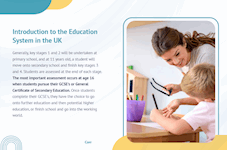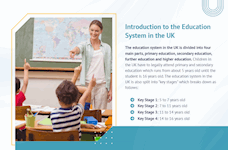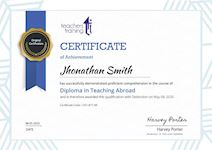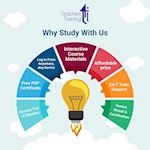KS1 and KS2 Teaching Assistant
FREE PDF Certificate | Audio Visual Training | Tutor Support | 1 Year Access
The Teachers Training
Summary
- Tutor is available to students
Overview
Over the years, the education system has evolved. It isn’t limited to bookish knowledge anymore; it also includes instilling the proper morals, values and etiquettes. It is quite tricky for class teachers to do all these by themselves, so there’s an increasing demand for Teaching Assistants (TA).
A teaching assistant plays a crucial role, from ensuring each student gets individual attention to making lesson plans. They ensure instructions are followed, and each student receives individual attention. A teaching assistant is the right-hand man of a teacher or educator. This KS1 and KS2 Teaching Assistant course will help you unleash your potential and become the best Teaching Assistant.
Through this course, you will learn all the responsibilities and different teaching techniques needed to be a Teaching Assistant. Additionally, you will find out how to keep children motivated and deal with students with special needs. Along with these, this course will educate you on SEN report writing skills and formulating personalised learning. Furthermore, you will develop a clear idea of the national curriculum in England and the education system in the UK.
This teaching assistant course is the perfect solution for acquiring the most valuable skills and effective teaching strategies. So sign up now for the Teaching Assistant course and avail yourself of one of the most influential roles!
What you will gain from this Teaching Assistant course:
- Get introduced to the education system in the UK
- Discover the responsibilities and qualifications needed to be a TA
- Be competent in formulatingpersonalised learning for students with special educational needs
- Acquire knowledge about national curriculum in England
- Find out about different types of schools in the UK
- Comprehend the concept of the importance of early years in development
- Adapt the techniques to keep children motivated
- Master the art of English teaching strategies
- Learn the basics of different primary subjects (Mathematics, Science, etc.)
Course media
Description
Course Curriculum
*** KS1 and KS2 Teaching Assistant ***
Module 01: Primary Education in the UK
- Introduction to the Education System in the UK
- Primary Teacher Workforce in England
- Teaching Assistant
- Professional Development as a TA
- Career Prospects
- What Is Ofsted?
Module 02: Responsibilities, Qualifications and Skills
- Responsibilities of TA
- Qualifications
- Skills and Knowledge
Module 03: Children with Special Educational Needs
- Range of Needs
- Differentiation Learning
- Personalised Learning
- Implications and Challenges
- SEN Report Writing
Module 04: National Curriculum in England
- The School Curriculum
- The National Curriculum
- Inclusion
- Language and Literacy
Module 05: Types of Schools in the UK
- Faith schools
- Free schools
- Academies
- City technology colleges
- State boarding schools
- Private schools
Module 06: Importance of Early Years in Development
- EYFS and Every Child Matters
- Provider Responsibilities
- Organisation
- Partnership Working
Module 07: EYFS Teaching Techniques
- The Different Teaching Techniques
- Indirect Teaching
- How to Keep Children Motivated
Module 08: Child Development
- Child Care Legislation
- Eligibility
- Flexibility
- Quality
Module 09: Moving to Key Stage 1 from EYFS
- Learning Journey
- The EYFS
- The Transition
Module 10: Starting at Key Stage 1
- Place of Play in Key Stage 1
- Finding a Balance
Module 11: English Requirements at Key Stage 1
- Key Stage 1 – Year 1
- Word Reading at Year 1
- Reading Comprehension at Year 1
- Writing – Transcription at Year 1
- Handwriting at Year 1
- Writing – Composition at Year 1
- Key Stage 1 – Year 2
- Word Reading at Year 2
- Writing – Transcription at Year 2
- Handwriting at Year 2
Module 12: English Requirements at Key Stage 2
- Lower Key Stage 2 – Years 3 and 4
- Word Reading at Lower Key Stage 2
- Handwriting at Lower Key Stage 2
- Upper Key Stage 2 – Years 5 and 6
Module 13: English Teaching Strategies
- Make Learning Goals Clear
- Play with Language
- Offer Feedback
- Sensory Play
- Teaching Writing
- Teaching Spelling
Module 14: Mathematics for Key Stage 1
- Key Stage 1 – Year 1
- Counting
- Addition and Subtraction
- Odd and Even
- Multiplication
- Grouping Problems
Module 15: Mathematics for Lower Key Stage 2
- Number and Place Value – Year 3
- Fractions – Year 3
- Measurement – Year 3
- Measurement – Year 4
- Statistics – Year 4
Module 16: Mathematics for Upper Key Stage 2
- Geometry – Year 5
- Algebra – Year 6
- Measurement – Year 6
- Geometry – Year 6
- Statistics – Year 6
Module 17: Teaching Strategies for Mathematics
- Number
- Place Value and Ordering
- Misconceptions
- Unpicking the Progression
- Calculator
- Generalising
- 2-D and 3-D Shape
- Position and Coordinates
- Direction and Angles
Module 18: Science for Key Stage 1
- Working Scientifically
- Animals, Including Humans
- Everyday Materials
- Seasonal Changes
Module 19: Science for Key Stage 2
- Science at Lower Key Stage 2
- Plants - Lower Key Stage 2
- Animals - Lower Key Stage 2
- Evolution and Inheritance
Module 20: Science Teaching Strategies
- Children’s Ideas
- Teacher Exposition
- Demonstration
- Practical Activities
- Role-Play
- Differentiating Work
- Teaching Groups
Module 21: Geography and History Study Program
- Geography Study Program
- History Study Program
- History at Key Stage 1 & 2
Module 22: Geography and History Teaching Strategies
- Effective Geography Learning
- Play and Role-Play
- Demonstrations
- History Learning
- Exploring Chronology
- Using Clues
- Historical Enquiry
Module 23: Other Primary Subjects for Key Stage 1
- Art and Design
- Physical Education
- Computing
- Design and Technology
- Cooking and Nutrition
Module 24: Other Primary Subjects for Key Stage 2
- Foreign Language
- Art and Design
- Physical Education
- Music
- Computing
Course Assessment
To successfully complete the KS1 and KS2 Teaching Assistant course, students will need to complete a multiple-choice question assessment. All our assessments are online, and you will receive instant results through our online platform.
Certification
Certification from Teachers Training
After successfully passing the multiple-choice assessment, you will qualify for a Certification from Teachers Training.
- Get instant access to your free PDF certificate after successfully completing the assessment
- Order a hard copy certificate to be posted to you for only £8.99!
Your KS1 and KS2 Teaching Assistant course certificate will add new, exciting skills to your CV and allow you to stand out from the crowd when applying for teaching jobs.
Who is this course for?
This KS1 and KS2 Teaching Assistant course is ideal for those already in the teaching profession who want to add new skills to their CV, or prospective students who want to build their skill set and kickstart their teaching career.
This KS1 and KS2 Teaching Assistant provides you with the necessary skills, knowledge and experience you need to progress your career and enhance your professional development.
Requirements
The KS1 and KS2 Teaching Assistant course from Teachers Training has no formal entry requirements. However, to study the KS1 and KS2 Teaching Assistant students must:
- Have a strong passion for learning
- Display a good understanding of the English language, as well as numeracy and IT skills
- Have a desire for entrepreneurship
- Be over the age of 16
If you meet these criteria, you can start studying the KS1 and KS2 Teaching Assistant course straight away!
Career path
Completing this KS1 and KS2 Teaching Assistant course will brush up your existing skills and knowledge also make way for multiple job opportunities, including—
- Teacher Assistant
- Educational Assistant
- Paraprofessional Educator
- Teacher/ Educator
For these career opportunities, the average salary generally varies from £10,000 to £ 25,000 a year.
Questions and answers
Do you only get given one chance to pass these? Or do you get how ever many chances till you pass ( all courses on here ) thanks
Answer:Good Afternoon, you will be given 3 chances to attend the mock exam before you attend the final exam for practicing purposes. However, if you still fail the final exam, you will need to make an additional charge for retaking the final exam.
This was helpful.
Reviews
Currently there are no reviews for this course. Be the first to leave a review.
Legal information
This course is advertised on reed.co.uk by the Course Provider, whose terms and conditions apply. Purchases are made directly from the Course Provider, and as such, content and materials are supplied by the Course Provider directly. Reed is acting as agent and not reseller in relation to this course. Reed's only responsibility is to facilitate your payment for the course. It is your responsibility to review and agree to the Course Provider's terms and conditions and satisfy yourself as to the suitability of the course you intend to purchase. Reed will not have any responsibility for the content of the course and/or associated materials.






